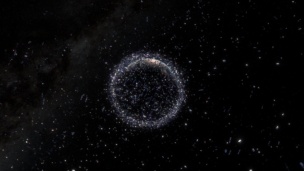The growing amount of space debris in orbit is an “urgent issue” that must be addressed by international organizations, according to the G7 nations meeting in Japan this weekend.
“We strongly encourage further research and development of orbital debris mitigation and remediation technologies,” officials wrote in the communiqué from the G7 Science and Technology Ministers’ Meeting, which concluded ahead of the full summit. “We also strongly encourage development of national guidelines and regulatory frameworks for remediation that align with guidelines developed within UN COPUOS.”
The path forward
The communiqué is not a binding document, but the nations still committed in it to take some steps to support debris mitigation, including:
- Following guidelines set by international bodies such as the UN’s Committee on the Peaceful Uses of Outer Space or the Inter-Agency Space Debris Coordination Committee
- Sharing national best practices on SSA and reducing debris
- Supporting work to draft new debris mitigation regulations
On the world stage
While space did get a shoutout in the science ministers’ readout, it’s unlikely to play a key role in the discussion at the broader G7 summit, where world leaders are expected to focus on Russia’s war in Ukraine, China’s rise, climate change, nuclear disarmament, and resiliency in food and supply chains.
“It’s absolutely essential for space to be addressed in major global fora like the G7 and NATO”, according to Benjamin Schmitt, a senior fellow at the University of Pennsylvania and cofounder of Duke’s Space Diplomacy Lab, who said that “space needs to play a more prominent role in international meetings like the G7 in the future, especially given the massive scale of the contemporary space economy.”
Giovanni Zanalda, a professor at Duke and Schmitt’s fellow cofounder at the Space Diplomacy Lab agreed, pointing out that problems surrounding space debris and norms of behavior in orbit are not things that should be pushed off to deal with later.
“Space requires such a long-term horizon that sometimes from a political point of view it is not a priority. But it should be a priority because the more we wait…[problems are] getting worse and worse. And the worse they become, the more difficult it is to address them,” he said. “It’s a matter of making sure people and institutions know that space is not the future, it’s already the present.”





